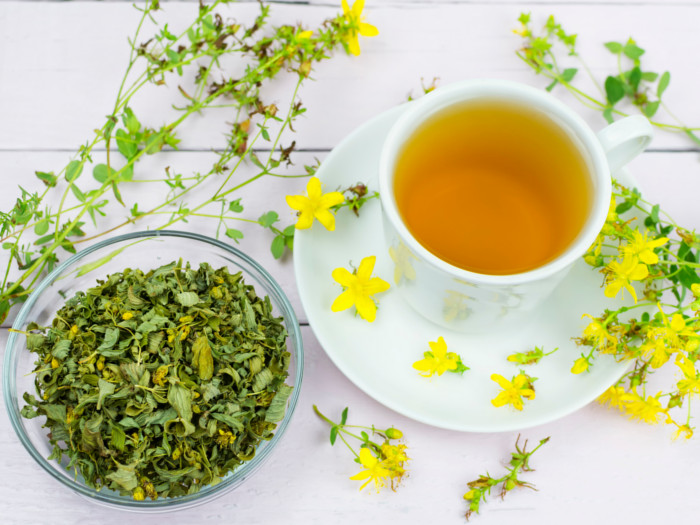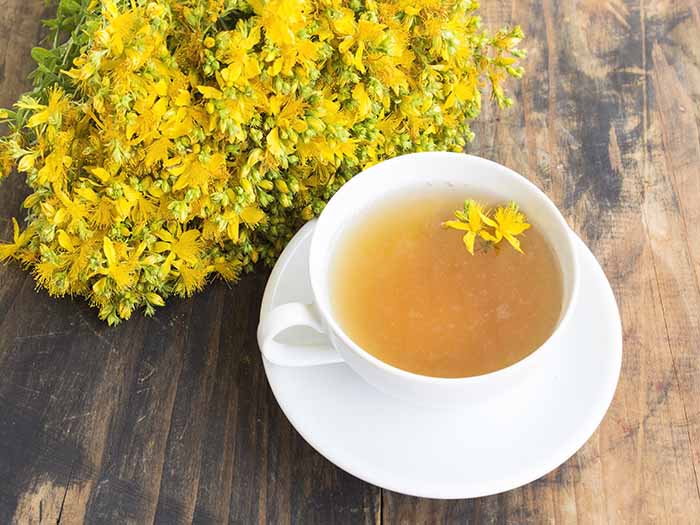St. John’s Wort tea is a popular use of this legendary herb, one that is not only delicious but also excellent for many aspects of your health.
What is St. John’s Wort Tea?
St. John’s Wort tea is an herbal concoction made by steeping the St. John’s Wort herb in hot water, along with a few other ingredients and spices for flavor and taste. St. John’s Wort is often consumed in supplement or capsule form, but the fresh herb is also available and can be used for various medicinal applications. For thousands of years, this herb has been made into tinctures, teas, and herbal remedies, and its effects remain highly sought after. Aside from its cultural, religious, and medicinal benefits, it also provides a strong and unique flavor that many people enjoy. [1]
St. John’s Wort Tea Benefits
St. John’s Wort tea has many amazing and powerful benefits, some of which include the following:
- Skin care
- Soothing respiratory ailments
- Treating insomnia
- Stress & anxiety
- Relieving side effects of menstruation
Let us discuss them in detail below.

An easy way to utilize the benefits of St John’s wort is through a cup of tea. Photo Credit: Shutterstock
Skin Care
Many studies have shown that St. John’s Wort tea can have an anti-inflammatory and invigorating effect on the skin, returning color and tone, and for soothing topical skin conditions when applied in a compress. [2]
Respiratory Health
The sedative and anti-inflammatory properties of this tea make it ideal for people looking to soothe or eliminate respiratory conditions. Drinking this tea once a day can clear up sore throats and drain congestion while helping to neutralize the underlying infection. [3]
Sleep Aid
This herbal tea is perhaps best known for its sedative effects, so for those who suffer from insomnia or who rarely get a good night of undisturbed sleep, this tea can make a major difference in your quality of life. [4]
PMS Symptoms
Women have been using St. John’s Wort in various forms for thousands of years to treat certain side effects of menstruation. From cramps and mood swings to fatigue and hunger pangs, this herb can ease that difficult time each month. [5]
Immune System
Regular use of this tea will stimulate the immune system and protect you against a wide range of infections.
Stress & Anxiety
Drinking St. John’s Wort tea also helps in relieving symptoms of stress and anxiety.
How to Make St. John’s Wort Tea?
Making St. John’s Wort tea at home is simple, provided you have access to the dried or fresh herb. Take a look at the recipe below.

St John's Wort Tea Recipe
Ingredients
- 2 cups of filtered water
- 3 tsp of fresh St John's Wart flowers (small yellow buds)
- 1 tsp of honey
Instructions
- To make St. John's Wart tea, bring 2 cups of water to boil in a saucepan.
- Add 3 teaspoons of fresh flowers (small yellow buds) to the water.
- Allow the mixture to steep for 4 minutes.
- Strain out the flowers and serve hot.
- Add honey for flavor, if desired.

St. John’s Wort Tea Side Effects
Despite the benefits, some of the potential side effects of this herbal tea include photosensitivity, complications with surgery, and issues for pregnant and breastfeeding women.
- Photosensitivity: Some people have reported increased photosensitivity when consuming this tea; if you feel like your eyes are extra sensitive to sunlight, stop drinking this tea. [6]
- Pregnancy: The powerful effects of this herb are not fully understood in the context of pregnancy or breastfeeding, and should be avoided.
- Surgery: The sedative effects of this herb can complicate the use of anesthesia, so it is best to stop using the herbal tea two weeks before any operation.
- Drug Interactions: If you are taking any medications, particularly those for nervous disorders or psychiatric problems, speak with your doctor before adding this tea to your health regimen.

